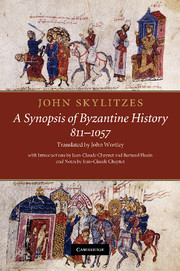Book contents
- Frontmatter
- Contents
- The English translator’s Preface
- Introduction
- Re-writing history: John Skylitzes’ Synopsis historion
- Foreword
- Chapter 1 Michael I Rangabe, the Kouropalates [811–813]
- Chapter 2 Leo V the Armenian [813–820]
- Chapter 3 Michael II the Stammerer [820–829]
- Chapter 4 Theophilos [829–842]
- Chapter 5 Michael III, the son of Theophilos [842–867], and his mother Theodora [842–862]
- Chapter 6 Basil I Kephalas, the Macedonian [867–886]
- Chapter 7 Leo VI the Philosopher (the Wise) [886–912]
- Chapter 8 Alexander [912–913]
- Chapter 9 Constantine VII, Porphyrogennetos [913–959]
- Chapter 10 Romanos I Lekapenos [919–944]
- Chapter 11 Constantine VII [944–959]
- Chapter 12 Romanos II the Younger [959–963]
- Chapter 13 Basil II Bulgaroktonos and Constantine VIII [976–1025]
- Chapter 14 Nikephoros II Phokas [963–969]
- Chapter 15 John I Tzimiskes [969–976]
- Chapter 16 Basil II and Constantine VIII bis [976–1025]
- Chapter 17 Constantine VIII [1025–1028]
- Chapter 18 Romanos III Argyros [1028–1034]
- Chapter 19 Michael IV the Paphlagonian [1034–1041]
- Chapter 20 Michael V Kalaphates [1041–1042]
- Chapter 21 Constantine IX Monomachos [1042–1055]
- Chapter 22 Theodora [1055–1056]
- Chapter 23 Michael VI the Elder/Stratiotikos [1056–1057]
- Glossary
- Bibliography
- Index
- References
Chapter 23 - Michael VI the Elder/Stratiotikos [1056–1057]
Published online by Cambridge University Press: 05 July 2014
- Frontmatter
- Contents
- The English translator’s Preface
- Introduction
- Re-writing history: John Skylitzes’ Synopsis historion
- Foreword
- Chapter 1 Michael I Rangabe, the Kouropalates [811–813]
- Chapter 2 Leo V the Armenian [813–820]
- Chapter 3 Michael II the Stammerer [820–829]
- Chapter 4 Theophilos [829–842]
- Chapter 5 Michael III, the son of Theophilos [842–867], and his mother Theodora [842–862]
- Chapter 6 Basil I Kephalas, the Macedonian [867–886]
- Chapter 7 Leo VI the Philosopher (the Wise) [886–912]
- Chapter 8 Alexander [912–913]
- Chapter 9 Constantine VII, Porphyrogennetos [913–959]
- Chapter 10 Romanos I Lekapenos [919–944]
- Chapter 11 Constantine VII [944–959]
- Chapter 12 Romanos II the Younger [959–963]
- Chapter 13 Basil II Bulgaroktonos and Constantine VIII [976–1025]
- Chapter 14 Nikephoros II Phokas [963–969]
- Chapter 15 John I Tzimiskes [969–976]
- Chapter 16 Basil II and Constantine VIII bis [976–1025]
- Chapter 17 Constantine VIII [1025–1028]
- Chapter 18 Romanos III Argyros [1028–1034]
- Chapter 19 Michael IV the Paphlagonian [1034–1041]
- Chapter 20 Michael V Kalaphates [1041–1042]
- Chapter 21 Constantine IX Monomachos [1042–1055]
- Chapter 22 Theodora [1055–1056]
- Chapter 23 Michael VI the Elder/Stratiotikos [1056–1057]
- Glossary
- Bibliography
- Index
- References
Summary
Michael was proclaimed ruling emperor on 31 August, ninth year of the indiction. When Theodosios the proedros, son of the brother of the father of the emperor Constantine Monomachos, heard of the proclamation he was deeply offended and, without stopping to think about what he was doing or counting the cost and the likelihood of it miscarrying or considering how the throw of the dice might turn out (as it were), he called up his relations, his slaves and others who served him in any way, many of his neighbours and some of his acquaintances, in fact as many as were somewhat hot-headed. Towards evening he set out with them from his house which lies in the district called Leomakellion and proceeded, complaining and protesting, along the main artery [Mese], as though they were going to the palace. As one who had been utterly wronged, he called out the injustice of it to those he encountered, demanding the throne as though it were a hereditary property which ought to be his because he was more closely related by blood to the departed emperor than the others. When he came to the praetorium he broke down the gates of the prison and led out the captives in the hope (I think) of accomplishing some great and noble deed with them. He did the same when he got to the Chalke. But when the uprising became known to the palace eunuchs they speedily armed the soldiers on guard duty in the palace, Romans and Varangians (the Varangians are a Celtic people serving the Romans as mercenaries), and speedily alerted the crews of the imperial ships. [482] An able-bodied company was assembled and made ready to be sent against Theodosios. When he learned of this he deviated from the route leading to the palace and fell back on the Great Church of God in the hope that when he entered that place the patriarch and clergy would receive him; that a numerous crowd would congregate and proclaim him emperor. Quite the opposite happened; the patriarch and the clergy of the church closed its gates to him as he arrived and of those who usually rejoice in such events and come running there was nobody at all.
- Type
- Chapter
- Information
- John Skylitzes: A Synopsis of Byzantine History, 811–1057Translation and Notes, pp. 449 - 465Publisher: Cambridge University PressPrint publication year: 2010

